 Petzlover
Petzlover American English Coonhound is originated from United States but Old Danish Pointer is originated from Denmark. American English Coonhound may grow 9 cm / 4 inches higher than Old Danish Pointer. American English Coonhound may weigh 8 kg / 17 pounds lesser than Old Danish Pointer. Both American English Coonhound and Old Danish Pointer has almost same life span. American English Coonhound may have more litter size than Old Danish Pointer. Both American English Coonhound and Old Danish Pointer requires Low Maintenance.
American English Coonhound is originated from United States but Old Danish Pointer is originated from Denmark. American English Coonhound may grow 9 cm / 4 inches higher than Old Danish Pointer. American English Coonhound may weigh 8 kg / 17 pounds lesser than Old Danish Pointer. Both American English Coonhound and Old Danish Pointer has almost same life span. American English Coonhound may have more litter size than Old Danish Pointer. Both American English Coonhound and Old Danish Pointer requires Low Maintenance.
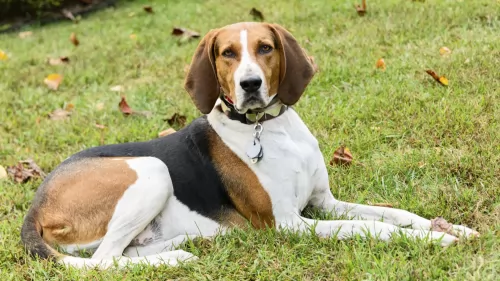 The American English Coonhound was developed in the Southern part of the United States from the variety of English hunting dogs that came to the States with the early settlers. At one point they were known as the Virginia Hound. This breed is well known for its prowess in hunting raccoons and her endurance and speed. Of course as a hound dog he loves to howl during the hunt and at home with the family. He can be frustrated and destructive if his energy and need for a job are not satisfied.
The American English Coonhound was developed in the Southern part of the United States from the variety of English hunting dogs that came to the States with the early settlers. At one point they were known as the Virginia Hound. This breed is well known for its prowess in hunting raccoons and her endurance and speed. Of course as a hound dog he loves to howl during the hunt and at home with the family. He can be frustrated and destructive if his energy and need for a job are not satisfied.
 Hailing from Denmark, the Old Danish Pointer originates back to 1710 and has been used as a pointing breed for finding game.
Hailing from Denmark, the Old Danish Pointer originates back to 1710 and has been used as a pointing breed for finding game.
Today they are essentially used as pet companions. Morten Bak mated local farm dogs with gypsy breeds, leading to the development of piebald purebred dogs. These were named Old Danish Pointers.
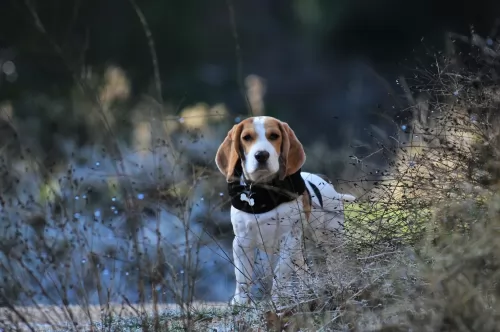 The American English Coonhound is an athlete with a deep chest and cute face. They have broad heads, domed skulls, dark eyes and soft, low ears. They are as fast and athletic as they look. These are highly athletic dogs with long legs and a slim but muscular body. They are so well built for their hunting role, that any deficiencies are quickly identified and bred out of the breed.
The American English Coonhound is an athlete with a deep chest and cute face. They have broad heads, domed skulls, dark eyes and soft, low ears. They are as fast and athletic as they look. These are highly athletic dogs with long legs and a slim but muscular body. They are so well built for their hunting role, that any deficiencies are quickly identified and bred out of the breed.
 The Old Danish Pointer is a medium-sized, purebred dog standing at between 50 and 60cm in height and weighing between 26 and 35kg.
The Old Danish Pointer is a medium-sized, purebred dog standing at between 50 and 60cm in height and weighing between 26 and 35kg.
This beautiful dog is muscular and lean with a broad head, floppy ears and a long thin tail. The coat is smooth and short haired and is white with large reddish brown patches as well as some freckling.He is an average shedding dog.
He has dark brown eyes. He is amicable and gets on well with children in the home as well as with other dogs. Even so, it is best to have him trained and socialized as he becomes obedient and more amicable than he already is. If you decide to go in for breeding your dog, you can expect 4 to 6 puppies.
Quiet, calm and steady, the Danish Pointer is also stubborn, and this is why training and socialization is so important for him.
Outdoors and perhaps on a hunt he becomes highly animated and alive, but back home with his family he is a calm, loving, devoted family pet and loves spending time with his human family. He forms a close bond with his human owner and when he is well trained, he likes to please his owner.
He is intelligent too and finds learning new things easy.
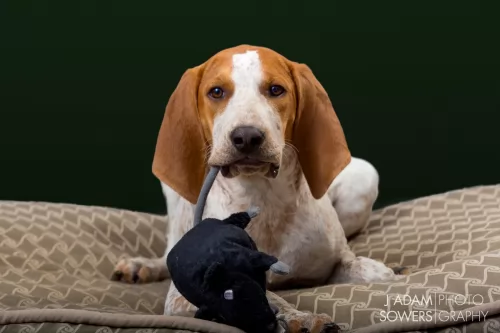 The American English Coonhound knows how to relax just as much as he knows how to work. He is mellow after work and tenacious in the chase. This is not the dog for a first-time owner. They are stubborn and hard to train. They howl and bark at home as much as they do on the hunt. They need a strong pack leader, especially when living in the city or neighborhoods.
The American English Coonhound knows how to relax just as much as he knows how to work. He is mellow after work and tenacious in the chase. This is not the dog for a first-time owner. They are stubborn and hard to train. They howl and bark at home as much as they do on the hunt. They need a strong pack leader, especially when living in the city or neighborhoods.
They are outgoing and friendly and very sensitive. They mature later than most other breeds their size. They are about 2 when they mature.
 Not only is the Old Danish Pointing Dog an excellent hunter, he is also friendly and loving when he is just being a pet.
Not only is the Old Danish Pointing Dog an excellent hunter, he is also friendly and loving when he is just being a pet.
These dogs are quiet, amicable pets enjoying the time they spend with their human family. He is low maintenance, he gets on well with children and other pets and he doesn’t spend his time barking endlessly at nothing.
When you take this well mannered, quiet, loving dog into your home, you can be prepared to have up to 14 brilliant years of companionship from him.
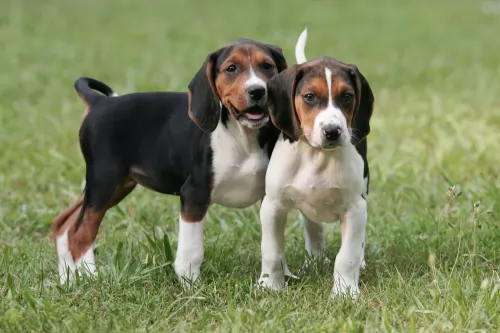 If kept active and happy, the American English Coonhound has very few health problems. The benefit from a large gen pool but do have some health concerns including elbow and hip dysplasia, ear infections, cataracts, bloat, and Progressive Retinal Atrophy. They do have a tendency to gain weight as they age. These issues will be addressed in more detail below. DNA testing is available for the dysplasia and eye issues.
If kept active and happy, the American English Coonhound has very few health problems. The benefit from a large gen pool but do have some health concerns including elbow and hip dysplasia, ear infections, cataracts, bloat, and Progressive Retinal Atrophy. They do have a tendency to gain weight as they age. These issues will be addressed in more detail below. DNA testing is available for the dysplasia and eye issues.
 The Old Danish Pointer is a healthy dog and you’re not likely to be spending too much time at the vet with him.
The Old Danish Pointer is a healthy dog and you’re not likely to be spending too much time at the vet with him.
However there are always dog illnesses that you need to look out for, and hip dysplasia is always on the top of the list.
While this disease is more prevalent in larger dogs, it can strike smaller dogs too, and in fact dogs of any age. This is a condition where the hip joint doesn’t form properly, so that arthritis and inflammation sets in. It is very sad as you notice your once active dog becoming increasingly immobilized with pain and discomfort.
Eye infections can include entropion and ectropion – conditions where the eyelids irritate the surface of the eye.
Ear infections too, can cause your pet a lot of distress and he will shake his head and scratch his ears. Inside the ears, it will be red and possibly there will be a discharge. This is also more prevalent among dogs with floppy ears. The idea is to try and keep the inside of the ears clean and dry.
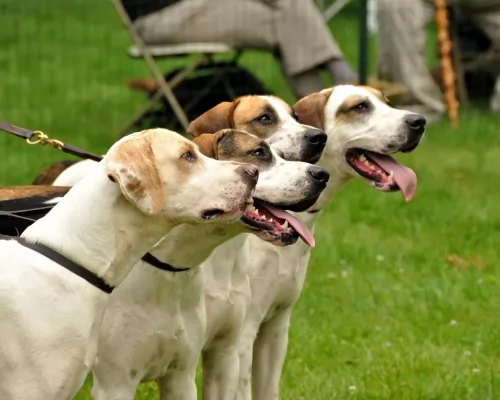 your working American English Coonhound needs different food than one who is not working. So, if you hunt with your dog remember he really needs the calories to keep his energy up. However, they can get obese as they age so cut back with less activity and more years. Watch the number of treats when training.
your working American English Coonhound needs different food than one who is not working. So, if you hunt with your dog remember he really needs the calories to keep his energy up. However, they can get obese as they age so cut back with less activity and more years. Watch the number of treats when training.
Elbow and Hip Dysplasia – the joint issues prevent the bones from connecting and functioning properly. Any good breeder of American English Coonhounds will do tests for both.
Eye issues range from cataracts to PRA (Progressive Retinal Atrophy) Again there are tests available for these conditions.
Bloat is a condition many medium to large size dogs can experience when their stomach can become inverted and intestines distended. The is a situational issue and can’t be predicted. Don’t allow your coonhound to wolf down food right before exercise and feed him more than once a day in a smaller meal.
The American English Coonhound needs a lot of exercise and has an extremely strong work and prey drive.
 With his short coat, the Old Danish Pointer is looked upon as a low maintenance breed. You can brush him twice a week and at the same time check him over for fleas and ticks, ear and eye infections as well as dental infections.
With his short coat, the Old Danish Pointer is looked upon as a low maintenance breed. You can brush him twice a week and at the same time check him over for fleas and ticks, ear and eye infections as well as dental infections.
Check his nails too, as many dogs have been injured when their long nails have hooked onto things and ripped open the flesh. When he gets used to it, your pet will find these grooming sessions therapeutic and relaxing, loving the bonding time you spend with him.
Your beautiful Old Danish Pointer loves to spend time outdoors and he is far better suited to life in the countryside and in the suburbs as opposed to life in the city. Give him the chance to take part in a hunt, and he’ll relish it. He also loves long walks where he can even perhaps be let off the leash as well as the chance to go swimming. He is at his happiest when he is tired at the end of the day from hiking, running, swimming and camping.
You can conveniently feed your Old Danish Pointer from the top quality commercially manufactured foods. Just be sure to check the labeling as you want to be sure he gets in the right amount of vitamins and minerals and avoids those foods high in colorants, preservatives and useless fillers.
Keep your dog’s diet simple and nutritious and try to add in some homemade food to his kibble from time to time. Boiled chicken, brown rice or pasta and some cooked vegetables such as sweet potatoes, spinach and carrots will keep him healthy and active. You can also try to include some raw meat occasionally.
Make sure he always has access to cool, fresh drinking water.